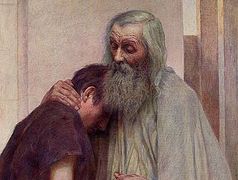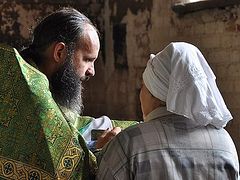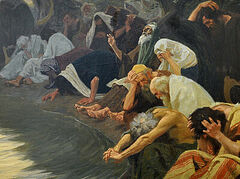The Holy Church prepares us for the spiritual labors of Great Lent, to meet Christ’s Resurrection. The three weeks preceding Great Lent remind us of the coming repentance, humility, Confession, and prayer. We talked on this theme with the spiritual director of the Kiev Theological Schools, Archimandrite Markel (Pavuk), an author of Pravoslavie.ru
—Fr. Markel, what does the Sunday of the Prodigal Son teach us?
—When we hear the phrase, “prodigal son”,1 because of our own sinfulness and passionateness we might have associations with those impure images that fill our modern-day television and internet, and with which, uncontrolled by parents, many people are taken up from an early age.
But prodigality is connected not only with physical impurity. There is also spiritual prodigality—that is, betrayal of God, when our own interests, our not just evil but even good interests become higher to us than God’s commandments. (An example of this from the Christian point of view is the political cry “Ukraine over all!”) In such a state, like the prodigal son of the Gospels we leave the Source of life—the Heavenly Father—and seek pleasure in corruptible things of this world: wealth, power, glory, or coarse sensual pleasures. Often, all of this comes together.
But a person who lives without God quickly dissipates his vital physical, intellectual, or creative energies and begins to acutely feel his inner spiritual emptiness, which he can’t fill with anything earthly. The more he tries to fill it, for example with alcohol or drugs, the more he destroys his own personality and completely darkens the image of God in himself. And whatever he takes up in life just falls apart. It’s good if through suffering he comes to himself and like the prodigal son, returns to the Father’s house. But how many people perish senselessly because they never listen to the voice of their conscience, which tells them to abandon everything sinful and passionate and begin a new life with God.
—The father who fulfilled his son’s request to go to a “far country” knew that his son could perish after receiving his inheritance. Why then did he give him a portion of his possessions?
—Unlike us human beings, the Lord never forces our human will with strict limitations and orders. He only shows through His commandments what is good and what is bad. And every person is free to choose who it is better for him to obey—God, or his relatives, friends, and acquaintances. Just the same, in order to prefer the invisible God over people near us, who often push (tempt) us into sin, we have to have firm faith—but none of us have enough of it.
Therefore, it happens that we leave the Father’s house without a second thought, make many mistakes, and more often than not come to ourselves only through pain and suffering, strengthen our faith, and return to God. For example, our friends try to get us to drink. This could make us happy, or it could make us want to refuse, if we have the fear of God and we remember that waiting for us at home is our wife, children (or parents), and it will be very painful for them if we come home drunk and even behave ourselves unseemly. If a person has at least a little faith and conscience, then he’ll choose the second option, even sacrificing his time with friends.
—Is there something this story has in common with the Parable of the Publican and Pharisee? In both instances there is repentance in a state of extreme fallenness. How could we project this repentance onto today?
—When someone sins, like the prodigal son, at first difficult it is to admit it; he considers himself no worse than others, and in many ways even better. Thus he judges everyone around him, putting himself even higher than others. And finally he doesn’t even notice how he has begun to play the part of the Pharisee despite the fact that he has fallen into sins. He poses as a righteous man before people, but secretly he sins, justifying himself with weakness, his environment, and circumstances of life—or he just accepts sin as a norm, just a “chemical reaction to irritants”.
But true spiritual life begins with repentance, when we admit that we are sinners and stand before the impartial Judgment of God, the judgment of our conscience. It is very difficult to admit to our sins, and therefore St. Peter Damascene says that whoever sees his sins is greater than one who raises the dead. From this we can understand why the repentant prayer of the publican is given to us as an example, and it is given to us as the opposite to the self-praise of the self-satisfied Pharisee.
—Father, could we see in the image of the son a whole nation, like for example, Ukraine? After all, the Lord gave this new nation a huge inheritance, but now it’s impoverished?
—Political life is hard to compare with spiritual life. It’s better to hold to the principle of rendering to Caesar what is Caesar’s and to God what is God’s. Therefore we should see ourselves in the image of the son, rather than the country: “I am the worst sinner and I live in a the country that I deserve according to my iniquities.” We have a very apt saying, that every nation is worthy of its ruler. If instead of blaming others every person would begin to repent of his own sins, then the political situation would change for the better.
Many of us, for example, lived in the Soviet Union. It seemed that nothing could be worse—the first atheistic government in the world, with terrible persecutions against Christians! But through the prayers of the New Martyrs and Confessors of the Russian Church, everything changed in the country. The main thing now is not to slacken spiritually so that the Gospel prophecy would not happen to us: The washed swine returns to wallow in the dirt. Christian believers must never relax spiritually.
Only people who have achieved sanctity and passionlessness themselves can rebuke the authorities and get involved in politics. Such were the Old Testament prophets, also St. John the Forerunner, or Holy Hierarchs Philip and Hermogenes of Moscow. When we, sinful and unworthy, start rebuking someone, as a rule we just pour oil on the fire.
All the revolutionaries who fiercely fought with injustice later, as a rule, resorted to even worse injustices. We recall what happened in 1917… And we can compare this with the horrors that followed our Maidan [coupe] of 2013–14. If Orthodox Christians, having forgotten the Lord’s commandments, stand on the side of one or another group of revolutionaries or radicals, then they themselves might serve in the development of yet greater evil, yet greater bloodshed…
—Is participating in schism also spiritual prodigality in some sense? After all, “blud” is the root of the words “zablusitsa”,2 i.e., to err or become lost…
—Truly, every schism is spiritual error; but if people are normally ashamed of bodily fornication, then those in schism to the contrary are proud of it today. What shame should Philaret (Denisenko) be feeling for having betrayed the Church that had given him everything?But instead of shame there is pride, anger, and aggression, aimed at those who disagree with him.
And how could his spawn, Sergei (Epiphany) Dumenko and those with him, not become terribly embarrassed! They rose up against the man who raised them. But instead they have even greater and more terrible ingratitude and audacity…
That all the schismatics were and are totally supported by both the former and present-day revolutionaries only confirms their error and spiritual fornication. They do not want to understand the words of the apostle that our struggle is not against flesh and blood—that is, not against specific persons—but against powers and spirits of evil under the heavens.
—How should an Orthodox Christian live during this week of the prodigal son? What feelings should he have?
—First of all, he should get rid of the theater (game-playing) in his life, strive to be authentic, wholesome, and not just create an appearance of chasteness, righteousness, love, and honesty. When we stop playing at life, when we want to not seem to be but to really be, as the Royal Martyr Elizabeth [Feodorovna] said, only then will we experience the true joy of being; only then will we feel happy. But on stage, playing a role, we can only imitate joy, life, and death…
—One more question: With what disposition are we called to approach the Sunday of the Last Judgment, and finally, Forgiveness Sunday? And then enter into Great Lent, preparing ourselves to greet the Pascha of Christ? Could we say that at the foundation of all repentance lies the call to greet Christ’s Resurrections?
—We have to remember that the time of our earthly life is very short, and we have to manage before the end to change very much not in others but in ourselves: to array ourselves in humility in place of pride; meekness in place of anger; mercy in place of love of money; chasteness in place of lustful desires. As we can see, there is no end to work we have to do!
All of this is made possible through fasting, prayer, repentance, and other virtues. If only we would do this not as a formality but with self-sacrifice, desiring to ascend with Christ to Golgotha and be spiritually resurrected for eternal life.
—In what consists the wisdom of our Church, which has established these preparatory weeks like this?
—Even the laziest and weakest Christian, if he at least partially begins to pay attention to and understand what is read and sung in the Church during this time, cannot remain without spiritual growth, and cannot but bring forth the fruits of good works. But most importantly, he will be transformed from the prodigal son into at least a repentant sinner—whom the Lord, Who has no need of repentance, loves the most.





